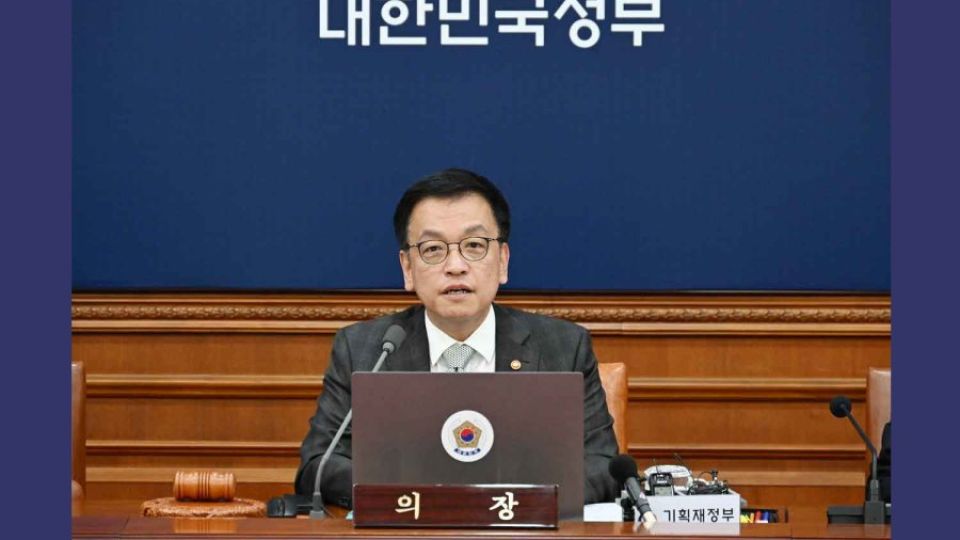February 19, 2025
SEOUL – The South Korean government declared an “all-out” efforts in response to escalating global tariff tensions on Tuesday, unveiling a substantial support package for local businesses under growing pressure.
“With the new Trump administration triggering a tariff war, South Korea faces increasing uncertainty on the exports front,” acting President Choi Sang-mok said in a Cabinet meeting. “We are now launching an all-out efforts on trade. From this point, how a country responds to the US-led trade war will shape its future.”
Choi convened a joint government meeting with key ministries to outline strategies for supporting the country’s exporters. Here, the government presented its “emergency export strategy,” a comprehensive program designed to assist local businesses facing escalating global tariffs.
Central to the plan is a record 366 trillion won ($253 billion) in trade finance support for small and medium-sized enterprises, aimed at reducing trade insurance costs, raising loan guarantee limits and expanding the overall scope of assistance.
An additional 8.5 trillion won will be allocated to mitigate foreign exchange volatility risks, including 4 trillion won in loan guarantees for core raw material imports, a doubling of foreign exchange risk insurance to 3 trillion won and 1.5 trillion won in policy funding for SMEs affected by high exchange rates.
Private sector participation plays a crucial role. Major commercial, regional and online banks will introduce products for SMEs totaling 2.35 billion won. Meanwhile, large conglomerates will collaborate with state-run institutions, with Korea Trade Insurance Corp. launching an “export support chain” guarantee offering preferential loans to SMEs, and the Export-Import Bank of Korea providing 3 trillion won in joint financing with interest rate discounts for suppliers to exporters.
In response to rising protectionism in key markets such as the US and China, the plan also targets export diversification, with a focus on emerging markets in the Global South. The government is considering the establishment or strengthening of 14 overseas offices, including new Korea Trade-Investment Promotion Agency offices in Mexico and Georgia in Eastern Europe, as well as Korea International Trade Association offices in Brazil, South Africa and Vietnam. A further 55 trillion won will be allocated to policy financing through trade insurance for the Global South.
The government is further boosting its promotional efforts for SMEs with a record 1.2 trillion won marketing budget, of which 70 percent will be allocated in the first half of the year to fund 144 exhibitions and consulting events for approximately 8,000 companies.
In 2024, South Korea posted a record export performance of $683.7 billion, an 8.1 percent on-year increase, driven by strong demand in sectors like semiconductors, which reached a record $141.9 billion in exports, and automobiles, which exceeded $70 billion for a second consecutive year.
The export outlook for this year is less optimistic, weighed down by growing challenges such as high interest rates and currency fluctuations. Trade pressures from the Trump administration, which has imposed levies including a 25 percent tariff on Mexico and Canada, an additional 10 percentage points on China and a 25 percent tariff on steel and aluminum set to take effect next month, are further exacerbating the situation. Plans to extend these tariffs to sectors like automobiles and semiconductors add to the uncertainty.
The situation is further strained for the export-dependent nation, with concerns mounting over a slowdown in the global semiconductor market due to declining memory chip prices and shrinking demand. The government has warned that the first half of the year will be critical, dubbing it the “last golden time” for South Korea to navigate the crisis and maintain its export momentum.
During the Cabinet meeting, Choi underscored ongoing joint outreach efforts by the public and private sectors aimed at enhancing Korea-US trade cooperation. He stated that a delegation of CEOs from the country’s top 20 conglomerates will embark on a two-day visit to the US from Wednesday to lay the groundwork for official government talks.


